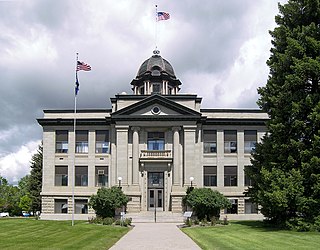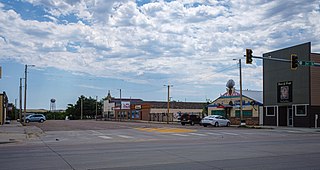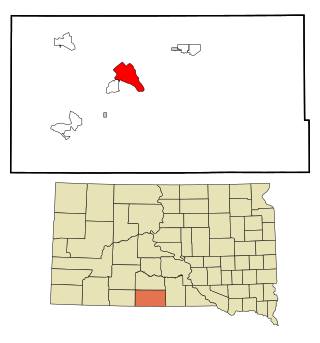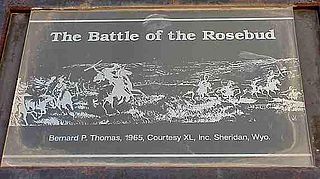
The Lakota are a Native American people. Also known as the Teton Sioux, they are one of the three prominent subcultures of the Sioux people, with the Eastern Dakota (Santee) and Western Dakota (Wičhíyena). Their current lands are in North and South Dakota. They speak Lakȟótiyapi—the Lakota language, the westernmost of three closely related languages that belong to the Siouan language family.

Wilcox County is a county of the U.S. state of Alabama. As of the 2020 census, the population was 10,600. Its county seat is Camden.

Rosebud County is a county in the state of Montana. It was established February 11, 1901, and has Montana vehicle license plate prefix 29. As of the 2020 census, the population was 8,329. Its county seat is Forsyth.

Mission is a city on the Rosebud Indian Reservation in northern Todd County, South Dakota, United States. The population was 1,156 at the 2020 census.

Rosebud also Sicanġu is a census-designated place (CDP) in Todd County, South Dakota, United States. The population was 1,455 at the 2020 census.

Rosebud is a city in Falls County, Texas, United States. Its population was 1,296 at the 2020 census.

The Battle of the Rosebud took place on June 17, 1876, in the Montana Territory between the United States Army and its Crow and Shoshoni allies against a force consisting mostly of Lakota Sioux and Northern Cheyenne Indians during the Great Sioux War of 1876. The Cheyenne called it the Battle Where the Girl Saved Her Brother because of an incident during the fight involving Buffalo Calf Road Woman. General George Crook's offensive was stymied by the Indians, led by Crazy Horse, and he awaited reinforcements before resuming the campaign in August.

"Rosebud" is the fourth episode of the fifth season of the American animated television series The Simpsons. It first aired on the Fox network in the United States on October 21, 1993. In the episode, Mr. Burns misses his childhood teddy bear Bobo on the eve of his birthday. After flashbacks reveal Bobo's journey through history, the bear ends up in the hands of Maggie Simpson. Burns does everything in his power to get Bobo back.

The Evangelical Lutheran Synodical Conference of North America, often known simply as the Synodical Conference, was an association of Lutheran synods that professed a complete adherence to the Lutheran Confessions and doctrinal unity with each other. Founded in 1872, its membership fluctuated as various synods joined and left it. Due to doctrinal disagreements with the Lutheran Church–Missouri Synod (LCMS), the Evangelical Lutheran Synod (ELS) and the Wisconsin Evangelical Lutheran Synod (WELS) left the conference in 1963. It was dissolved in 1967 and the other remaining member, the Synod of Evangelical Lutheran Churches, merged into the LCMS in 1971.

The Rosebud Indian Reservation is an Indian reservation in South Dakota, United States. It is the home of the federally recognized Rosebud Sioux Tribe, who are Sicangu, a band of Lakota people. The Lakota name Sicangu Oyate translates as the "Burnt Thigh Nation", also known by the French term, the Brulé Sioux.

Old Rosebud was an American Thoroughbred racehorse whose pedigree traced to the influential sire Eclipse, and through Eclipse to the founding stallion, the Darley Arabian. In the list of the top 100 U.S. thoroughbred champions of the 20th Century by Blood-Horse magazine, Old Rosebud ranks 88th. Despite a successful racing career, Old Rosebud was plagued by ailments throughout his life, culminating in a fatal injury at a claiming race when he was 11 years old.
Rosebud Township is a civil township in Barnes County, North Dakota, United States. As of the 2000 census, its population was 68.

Adamstown Rosebud Football Club is a semi-professional soccer club based in Adamstown a suburb of Newcastle, New South Wales. The club is part of Northern NSW Football and has teams competing in Senior and Youth NPL competitions. The club had played in the National Soccer League between 1984 and 1986 as Newcastle Rosebud United. Adamstown Rosebud is arguably the most famous football club in Newcastle and in 2019, the club entered its 130th year of competition, making the Rosebuds the oldest NPL club in Australia. To mark the occasion, the club wore a special commemorative strip that year, honouring its 130-year history and the Australian representatives the club has produced.

Rosebud Battlefield State Park in Big Horn County, Montana preserves a large portion of the battlefield of the Battle of the Rosebud, fought on June 17, 1876. The battle is known by various other names such as The Battle Where the Girl Saved Her Brother by the Northern Cheyenne, and Crook's Fight on the Rosebud. A National Historic Landmark, the park is a day use facility offering hiking, hunting, picnicking and wildlife viewing. It is located 11 miles (18 km) south of Kirby, Montana on Montana Highway 314.
Portland Rosebuds was the name of two professional men's ice hockey teams in Portland, Oregon. Both teams played their home games at the Portland Ice Arena. The first Rosebuds are notable for being the first American based team to be allowed to compete for the Stanley Cup. The second Rosebuds are notable in that their roster was used to build the NHL expansion Chicago Blackhawks.
Rosebud is an unincorporated community, census-designated place and river town in Rosebud County, Montana, United States. It is located approximately 1.5 miles east of the intersection of the Yellowstone River and Rosebud Creek. Interstate 94 passes south of the town.
Mike Kappus is an American music manager and record producer.
Rosebud is an unincorporated community in Greer Township, Warrick County, in the U.S. state of Indiana.
Rosa Jinsey Young was an African American Lutheran educator who worked primarilly in the Black Belt of Alabama. Born in Rosebud, Alabama, to Grant, an African Methodist Episcopal pastor, and Nancy Young, Rosa Young was the valedictorian of her 1909 graduating class at Daniel Payne College in Selma, Alabama. She founded her first school, Rosebud Literary and Industrial School, in 1912. Within two years, attendance at her school grew from 7 to 215.













